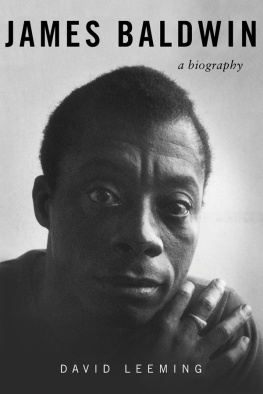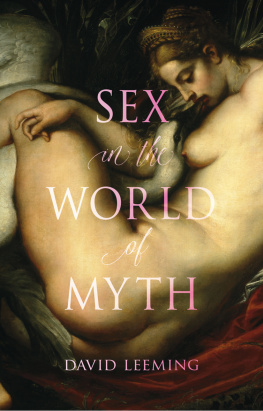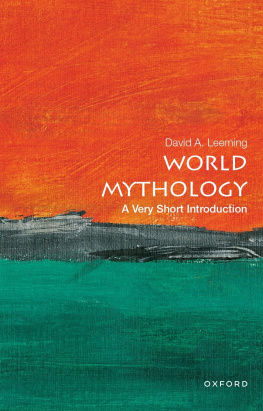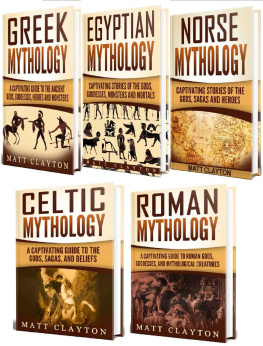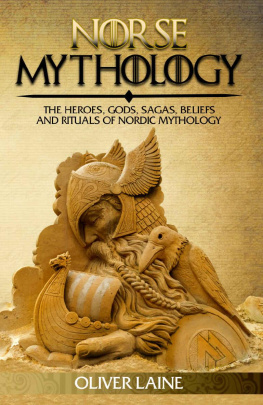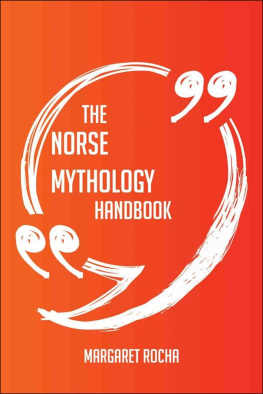David Leeming - The Oxford Companion to World Mythology
Here you can read online David Leeming - The Oxford Companion to World Mythology full text of the book (entire story) in english for free. Download pdf and epub, get meaning, cover and reviews about this ebook. year: 2005, publisher: Oxford University Press, genre: History. Description of the work, (preface) as well as reviews are available. Best literature library LitArk.com created for fans of good reading and offers a wide selection of genres:
Romance novel
Science fiction
Adventure
Detective
Science
History
Home and family
Prose
Art
Politics
Computer
Non-fiction
Religion
Business
Children
Humor
Choose a favorite category and find really read worthwhile books. Enjoy immersion in the world of imagination, feel the emotions of the characters or learn something new for yourself, make an fascinating discovery.

- Book:The Oxford Companion to World Mythology
- Author:
- Publisher:Oxford University Press
- Genre:
- Year:2005
- Rating:3 / 5
- Favourites:Add to favourites
- Your mark:
- 60
- 1
- 2
- 3
- 4
- 5
The Oxford Companion to World Mythology: summary, description and annotation
We offer to read an annotation, description, summary or preface (depends on what the author of the book "The Oxford Companion to World Mythology" wrote himself). If you haven't found the necessary information about the book — write in the comments, we will try to find it.
The Oxford Companion to World Mythology — read online for free the complete book (whole text) full work
Below is the text of the book, divided by pages. System saving the place of the last page read, allows you to conveniently read the book "The Oxford Companion to World Mythology" online for free, without having to search again every time where you left off. Put a bookmark, and you can go to the page where you finished reading at any time.
Font size:
Interval:
Bookmark:
David Leeming



Oxford University Press, Inc., publishes works that further Oxford Universitys objective of excellence in research, scholarship, and education.
OxfordNew York
AucklandCape TownDar es SalaamHong KongKarachi Kuala LumpurMadridMelbourneMexico CityNairobi New DelhiShanghaiTaipeiToronto With offices in
ArgentinaAustriaBrazilChileCzech ReupblicFranceGreece GuatemalaHungryItalyJapanPolandPortugalSingapore South KoreaSwitzerlandThailandTurkeyUkraineVietnam Copyright 2005 by Oxford University Press, Inc.
Published by Oxford University Press, Inc.
198 Madison Avenue, New York, New York, 10016
http://www.oup.com/us
Oxford is a registered trademark of Oxford University Press All rights reserved. No part of this publication may be reproduced, stored in a retrieval system, or transmitted, in any form or by any means, electronic, mechanical, photocopying, recording, or otherwise, without the prior permission in writing of Oxford University Press.
Library of Congress Cataloging in Publication Data
Leeming, David Adams, 1937
The Oxford companion to world mythology / by David Leeming p. cm.
ISBN 0-19-515669-2 (9780195156690) 1. MythologyEncyclopedias.I. Title.
BL312.L44 2005
201'.3dc22
2005014216
World mythology is a vast subject, one that encompasses the cultural dreams of the human race. A fully comprehensive book on world mythology would fill many volumes and would involve a seemingly infinite number of highly subjective choices of stories, characters, and themes. What we think of as Greece is a cultural entity made up of many cultures over time. Native American mythology is, in fact, made up of the mythologies of hundreds of tribes. The same can be said of African mythology, Germanic mythology, Indonesian mythology, Mesopotamian mythology, or any other large cultural grouping of myths. And there is the question of boundaries in connection with the definition of myth. Often it is difficult to say definitively, for instance, that a particular story is a myth rather than a legend or other type of folk tale.
In this book, I do not pretend to have covered every corner of world mythology. I have attempted to be inclusive and reasonably comprehensive. Not surprisingly, the majority of entries are products of the best known of the worlds mythological systems. There are more entries related to Greek, Egyptian, East Indian, Mesopotamian, Celtic, and Norse myths here than those pertaining to Ainu or Island Arawak myths. To a great extent, of course, this type of imbalance is a reflection of existing information and scholarship.
As for the distinction of myth versus legend or other type of folklore, I have taken a somewhat relaxed approach. It might well be argued that the Brer Rabbit story, for instance, is not really a myth. Without commenting on that question, I have chosen to include the story (and other folk stories that are perhaps not technically myths) because it has mythic aspects and can be usefully compared with a similar, perhaps more evidently mythic story from another culture.
Finally, I have not avoided the sensitive area of myth and religion. I have treated the sacred narratives of the great religions, including the monotheistic Abrahamic religions, as myths, not to deprecate those religions, but simply because to a believer in one religion the storiesespecially the supernatural onesof another religion tend to be seen as myth rather than history.
The lists at the beginning of the book, after the introduction, categorize entries according to both large (e.g., Asian, European) and narrower (e.g., Irish) cultural groups and in some cases according to themes (e.g., Arthurian myths) and general subjects (e.g., mythic themes). Included in these lists are all of the entries in the text, as well as (in brackets) some of the categories themselves (e.g., the Celtic category includes in its list [Arthurian myths], referring to all of the entries listed under the category Arthurian myths). Specific thematic categories are indicated by cross-referencing in the text (e.g., descent, hero, miraculous conception).
The articles themselves are arranged alphabetically. There are entries on the major religion-based and ethnicity-based mythologies, as well as entries on major mythological characters and themes and on other topics related to mythology. References, by author name (and year, if necessary), to items in the general bibliography at the end of the book are placed after particular articles in brackets to suggest further reading and to recognize significant source material.
Cross-references in the text are indicated by asterisks. For example, in the opening text of the entry on Achilles, Achilles is a central figure in *Homers *Iliad, an epic poem containing much of what we know of *Greek mythology... , cross-references will lead the reader to entries on Homer, the Iliad, and Greek mythology. In some cases the cross-referencing is general rather than specific. The cross-references in *Egyptians, *Aztecs, and the *Zuni are... concerned with... will lead the reader to entries dealing with various aspects of Egyptian, Aztec, and Zuni cultures, such as Egyptian mythology and Zuni creation.
To make names of individuals and places more easily pronounceable for English-speaking readers, I have, in most cases, avoided using the diacriticals that are often applied to transliterations of, for example, Greek, Sanskrit, Celtic, ancient Mesopotamian, and Semitic words. Thus, for instance, the name of the great Hindu destroyer and yogic god is spelled Shiva in the admittedly old-fashioned Anglicized manner, rather than Siva in the more academic manner, and the Hindu elephant-headed god is represented as Ganesh rather than Ganea.
The Nature and Dimensions of Myth
It is through symbol that man finds his way out of his particular situation and opens himself to the general and universal.
Mircea Eliade
Myths are for the most part religious narratives that transcend the possibilities of common experience and that express any given cultures literal or metaphorical understanding of various aspects of reality. To the extent that a religion is a system that lends authority to myths, a religion is a mythological system. This is so whether we are speaking of so-called primitive animistic cults or the equally arbitrarily defined great world religions. Religious stories are holy scripture to believersnarratives used to support, explain, or justify a particular systems rituals, theology, and ethicsand are myths to people of other cultures or belief systems. Inevitably, what begins as metaphor grows for some into divine word that is literal and absolute truth. Just as inevitably, many humans have insisted on confusing the logic of history and science with the quite different mytho-logic or mythology.
The parting of the Sea of Reeds and the resurrection of Jesus are myths for Hindus and Taoists. They are myths because they describe phenomena too far outside of our experience to be believed. By the same token, the Christian sees the stories of the elephant god Ganesh or the resurrection of the ancient Egyptian god-man Osiris as perhaps religious, perhaps even beautiful, but certainly bizarre and definitely mythological rather than literally true. Seas do not part; humans are not resurrected. Religious myths, however, are very different from the merely superstitious myths that abound in popular usage. We commonly use the word myth to mean a generally held belief or concept that is clearly not true, but merely fanciful. It is a myth that crime never pays, that George Washington never told a lie, that all women are intuitive, or that walking under a ladder brings bad luck. This definition of myth as false belief or superstition develops naturally enough from the more accurate understanding of the word as describing a fabulous and obviously untrue narrative of the deeds of heroes and godscharacters such as Odin or Pallas Athena or the Native American trickster. But whereas common-usage myths of the under the ladder sort are for the most part products of the secular world, mythic narratives are the sacred stories that are central to cultural identity because, for the cultures to which they belong, these religious myths convey some significant truth about the relationship between human beings and the source of being.
Font size:
Interval:
Bookmark:
Similar books «The Oxford Companion to World Mythology»
Look at similar books to The Oxford Companion to World Mythology. We have selected literature similar in name and meaning in the hope of providing readers with more options to find new, interesting, not yet read works.
Discussion, reviews of the book The Oxford Companion to World Mythology and just readers' own opinions. Leave your comments, write what you think about the work, its meaning or the main characters. Specify what exactly you liked and what you didn't like, and why you think so.

